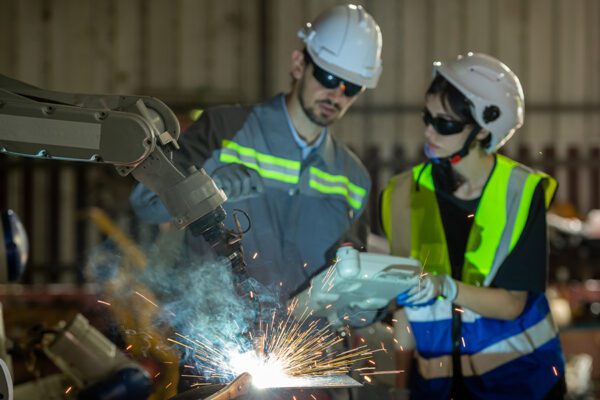Automation interest has increased in popularity for welding & gas distributors. While this poses a significant opportunity, don’t forget about the associated risk.
The fastest-growing welding & gas distributors in the country seem to have a consistent trend: they’ve been embracing automation. What started as welding robots now includes cutting tables, band saw machines, press brakes and more.
Selling automation has become a hallmark of a sophisticated, value-added distributor in the market today. Who doesn’t want to help a client struggling to find good talent while maximizing efficiency to fulfill customer demand?
While selling automation is clearly an area of big opportunity for distributors, it comes with some new risks that you should be aware of and decide what’s right for protecting your business.
New Risks
- Significant injury to your customers: Amputations, burns, contusions, and even death are possible with the equipment listed above. With “social inflation*” running rampant in lawsuits, settlements and courtrooms these days, it’s very likely that you could get pulled into a lawsuit, despite your best effort.
- Professional liability: If your salespeople are making claims about the financial return on investment and productivity of the equipment you are selling, you are likely creating exposure to a claim standard insurance policies don’t cover.
- Shipping risk: This equipment is often drop-shipped directly from the manufacturer. If the equipment is damaged in transit, be sure to know who is responsible for insuring the unit (i.e., FOB Shipping Point, FOB Destination Point, etc.).
What Can You Do to Limit Your Risk?
- Supplier agreement:
- Evaluate your contract with the automation vendor to see if they’re limiting their liability to you. Most are limiting their liability to the cost of the product or even a lower dollar amount.
- Attempt to negotiate more favorable language.
- Customer contract:
- Limit your risk through the use of a contract.
- Product Supply Agreement, Purchase Order Terms & Conditions, Master Contract.
- Limit the scope of your sales team:
- Don’t make any claims on productivity or financial promises.
- Consider Professional Liability insurance:
- If you are designing, consulting or even making financial promises on productivity, insurance coverage could help defend you and pay out a settlement.
- If you’re limiting your scope (above), it significantly lessens your exposure, possibly to a point where coverage could simply be a “nice to have” versus a “need to have.”
If you’re selling automation and these ideas are new to you, please give us a call. We can help you navigate a risk management discussion to best fit your business philosophy and risk tolerance. Not every welding distributor will want to limit their liability to their clients, as they don’t want to be perceived a certain way.
*Social inflation – a term that describes how insurers’ claims costs are increasing above general economic inflation due to society pointing the finger at deep pockets and a trend in increasing litigation costs brought by plaintiffs seeking large monetary relief for their injuries.
The Horton Group is the leading insurance broker to the industrial gas and welding distribution industry, working with over 100 clients coast to coast. If you’re interested in this topic or learning more about how we can help you with your insurance, safety and risk management programs, please contact Tony Hopkins, Welding & Gas Practice Leader (tony.hopkins@thehortongroup.com).
Other Industry Articles You Might Be Interested In
Material posted on this website is for informational purposes only and does not constitute a legal opinion or medical advice. Contact your legal representative or medical professional for information specific to your legal or medical needs.




